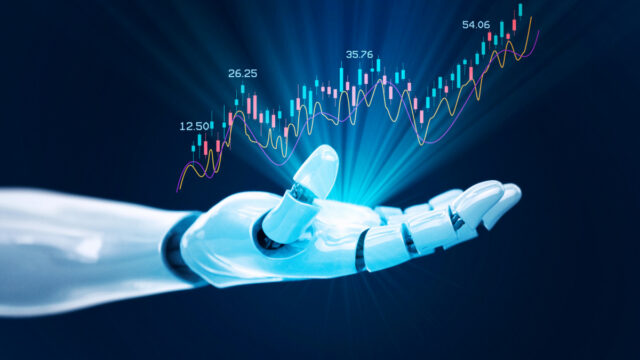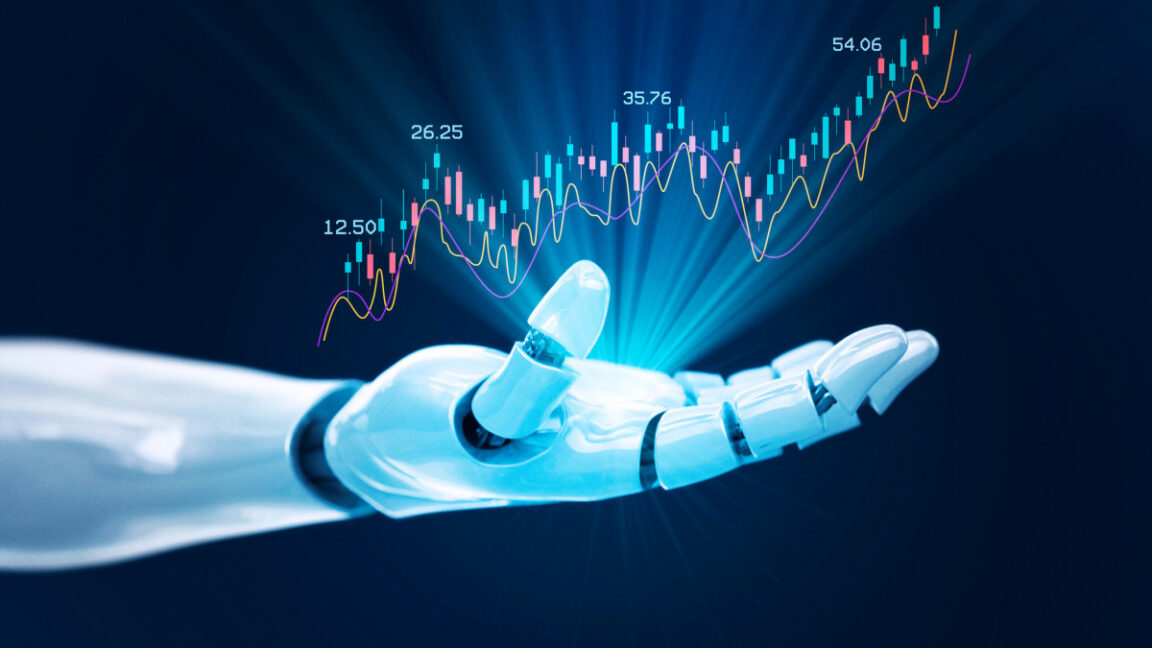- Регистрация
- 17 Февраль 2018
- Сообщения
- 38 917
- Лучшие ответы
- 0
- Реакции
- 0
- Баллы
- 2 093
Offline
AI-selected portfolios might perform well in a growing market, but experts warn of downturn risks.


Credit: Yuichiro Chino via Getty Images
With AI chatbots growing in popular usage, it was only a matter of time before large numbers of people began applying them to the stock market. In fact, at least 1 in 10 retail investors now consult ChatGPT or other AI chatbots for stock-picking advice, according to a Reuters report published Thursday.
Data from a survey by trading platform eToro of 11,000 retail investors worldwide suggests that 13 percent of individual investors already use AI tools like ChatGPT or Google's Gemini for stock selection, while about half say they would consider using these tools for portfolio decisions.
Unlike algorithmic trading, where computers automatically execute thousands of trades per second, investors are using ChatGPT as an advisory tool in place of human experts. They type questions, read the AI model's analysis, and then manually decide whether to place trades through their brokers.
Reuters spoke with Jeremy Leung, who analyzed companies for investment bank UBS for almost two decades. Leung now relies on ChatGPT for his multi-asset portfolio. "I no longer have the luxury of a Bloomberg terminal, or those kinds of market-data services which are very, very expensive," Leung told Reuters. "Even the simple ChatGPT tool can do a lot and replicate a lot of the workflows that I used to do."
Reuters reports that financial products comparison website Finder asked ChatGPT in March 2023 to select stocks from high-quality businesses based on criteria like debt levels and sustained growth. Since then, the resulting 38-stock portfolio has reportedly grown in value nearly 55 percent. That performance beat the average of the UK's 10 most popular funds by almost 19 percentage points.
But there's a huge caveat to that kind of AI success story: US stocks sit near record highs, Reuters notes, with the S&P 500 index up 13 percent this year after surging 23 percent last year. Those are conditions that can make almost any stock-picking strategy look smart.
Reuters frames the AI trading advice trend as a case of new technology tools "democratizing," or opening up, investment analysis once reserved for institutional investors with expensive data terminals. But experts warn that AI models can confabulate financial data and lack access to real-time market information, making them risky substitutes for professional advice.
"AI models can be brilliant," Dan Moczulski, UK managing director at eToro, told Reuters. "The risk comes when people treat generic models like ChatGPT or Gemini as crystal balls." He noted that general AI models "can misquote figures and dates, lean too hard on a pre-established narrative, and overly rely on past price action to attempt to predict the future."
The hazards of AI stock picking
Using AI to trade stocks at home feels like it might be the next step in a long series of technological advances that have democratized individual retail investing, for better or for worse. Computer-based stock trading for individuals dates back to 1984, when Charles Schwab introduced electronic trading services for dial-up customers. E-Trade launched in 1992, and by the late 1990s, online brokerages had transformed retail investing, dropping commission fees from hundreds of dollars per trade to under $10.
The first "robo-advisors" appeared after the 2008 financial crisis, which began the rise of automated online services that use algorithms to manage and rebalance portfolios based on a client's goals. Services like Betterment launched in 2010, and Wealthfront followed in 2011, using algorithms to automatically rebalance portfolios. By the end of 2015, robo-advisors from nearly 100 companies globally were managing $60 billion in client assets.
The arrival of ChatGPT in November 2022 arguably marked a new phase where retail investors could directly query an AI model for stock picks rather than relying on pre-programmed algorithms. But Leung acknowledged that ChatGPT cannot access data behind paywalls, potentially missing crucial analyses available through professional services. To get better results, he creates specific prompts like "assume you're a short analyst, what is the short thesis for this stock?" or "use only credible sources, such as SEC filings."
Beyond chatbots, reliance on financial algorithms is growing. The "robo-advisory" market, which includes all companies providing automated, algorithm-driven financial advice from fintech startups to established banks, is forecast to grow roughly 600 percent by 2029, according to data-analysis firm Research and Markets.
But as more retail investors turn to AI tools for investment decisions, it's also potential trouble waiting to happen.
"If people get comfortable investing using AI and they're making money, they may not be able to manage in a crisis or downturn," Leung warned Reuters. The concern extends beyond individual losses to whether retail investors using AI tools understand risk management or have strategies for when markets turn bearish.


Credit: Yuichiro Chino via Getty Images
With AI chatbots growing in popular usage, it was only a matter of time before large numbers of people began applying them to the stock market. In fact, at least 1 in 10 retail investors now consult ChatGPT or other AI chatbots for stock-picking advice, according to a Reuters report published Thursday.
Data from a survey by trading platform eToro of 11,000 retail investors worldwide suggests that 13 percent of individual investors already use AI tools like ChatGPT or Google's Gemini for stock selection, while about half say they would consider using these tools for portfolio decisions.
Unlike algorithmic trading, where computers automatically execute thousands of trades per second, investors are using ChatGPT as an advisory tool in place of human experts. They type questions, read the AI model's analysis, and then manually decide whether to place trades through their brokers.
Reuters spoke with Jeremy Leung, who analyzed companies for investment bank UBS for almost two decades. Leung now relies on ChatGPT for his multi-asset portfolio. "I no longer have the luxury of a Bloomberg terminal, or those kinds of market-data services which are very, very expensive," Leung told Reuters. "Even the simple ChatGPT tool can do a lot and replicate a lot of the workflows that I used to do."
Reuters reports that financial products comparison website Finder asked ChatGPT in March 2023 to select stocks from high-quality businesses based on criteria like debt levels and sustained growth. Since then, the resulting 38-stock portfolio has reportedly grown in value nearly 55 percent. That performance beat the average of the UK's 10 most popular funds by almost 19 percentage points.
But there's a huge caveat to that kind of AI success story: US stocks sit near record highs, Reuters notes, with the S&P 500 index up 13 percent this year after surging 23 percent last year. Those are conditions that can make almost any stock-picking strategy look smart.
Reuters frames the AI trading advice trend as a case of new technology tools "democratizing," or opening up, investment analysis once reserved for institutional investors with expensive data terminals. But experts warn that AI models can confabulate financial data and lack access to real-time market information, making them risky substitutes for professional advice.
"AI models can be brilliant," Dan Moczulski, UK managing director at eToro, told Reuters. "The risk comes when people treat generic models like ChatGPT or Gemini as crystal balls." He noted that general AI models "can misquote figures and dates, lean too hard on a pre-established narrative, and overly rely on past price action to attempt to predict the future."
The hazards of AI stock picking
Using AI to trade stocks at home feels like it might be the next step in a long series of technological advances that have democratized individual retail investing, for better or for worse. Computer-based stock trading for individuals dates back to 1984, when Charles Schwab introduced electronic trading services for dial-up customers. E-Trade launched in 1992, and by the late 1990s, online brokerages had transformed retail investing, dropping commission fees from hundreds of dollars per trade to under $10.
The first "robo-advisors" appeared after the 2008 financial crisis, which began the rise of automated online services that use algorithms to manage and rebalance portfolios based on a client's goals. Services like Betterment launched in 2010, and Wealthfront followed in 2011, using algorithms to automatically rebalance portfolios. By the end of 2015, robo-advisors from nearly 100 companies globally were managing $60 billion in client assets.
The arrival of ChatGPT in November 2022 arguably marked a new phase where retail investors could directly query an AI model for stock picks rather than relying on pre-programmed algorithms. But Leung acknowledged that ChatGPT cannot access data behind paywalls, potentially missing crucial analyses available through professional services. To get better results, he creates specific prompts like "assume you're a short analyst, what is the short thesis for this stock?" or "use only credible sources, such as SEC filings."
Beyond chatbots, reliance on financial algorithms is growing. The "robo-advisory" market, which includes all companies providing automated, algorithm-driven financial advice from fintech startups to established banks, is forecast to grow roughly 600 percent by 2029, according to data-analysis firm Research and Markets.
But as more retail investors turn to AI tools for investment decisions, it's also potential trouble waiting to happen.
"If people get comfortable investing using AI and they're making money, they may not be able to manage in a crisis or downturn," Leung warned Reuters. The concern extends beyond individual losses to whether retail investors using AI tools understand risk management or have strategies for when markets turn bearish.
